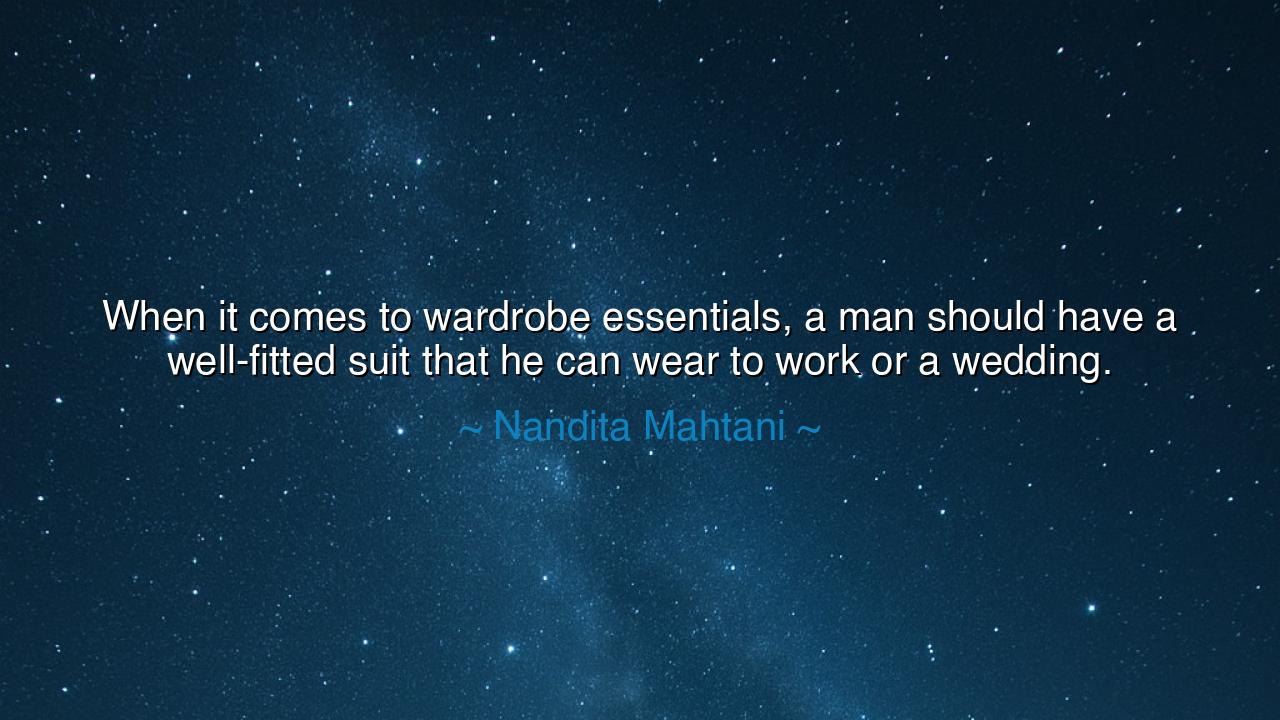
When it comes to wardrobe essentials, a man should have a
When it comes to wardrobe essentials, a man should have a well-fitted suit that he can wear to work or a wedding.






The words of Nandita Mahtani carry with them the voice of timeless counsel: “When it comes to wardrobe essentials, a man should have a well-fitted suit that he can wear to work or a wedding.” This is no mere advice on clothing, but wisdom on how presentation reflects the dignity of the soul. For garments are more than fabric; they are signals of discipline, self-respect, and readiness to meet the world with honor.
The ancients knew that attire bore weight beyond the body. The Roman senator donned his toga not only for comfort but as a declaration of his civic standing. The knight’s armor was not merely protection, but a proclamation of his calling. So too, the well-fitted suit becomes, in the modern age, a man’s armor of respectability—equally suited for the labors of work and the sacred vows of a wedding. It is the garment that bridges duty and celebration, labor and love.
History gives us examples of how dress has shaped destiny. When Abraham Lincoln, once a simple lawyer of the frontier, appeared in his black suit and stovepipe hat, he was no longer just a man of Illinois. He became the embodiment of solemnity, wisdom, and resolve. His clothing did not make his greatness, but it framed it, so that the world could behold and recognize it. In the same way, a well-fitted suit does not create virtue, but it makes virtue visible.
To possess such an essential garment is also to possess readiness. For life summons a man suddenly—to the boardroom, to the banquet, to the altar. Without preparation, one stumbles; but with the proper attire at hand, he walks with confidence into every realm. The suit, then, is not vanity but preparedness, a silent ally in the unpredictable theater of existence.
Therefore, let this wisdom be preserved: a man must not think lightly of his appearance, for it is the outward echo of his inward order. In his well-fitted suit, he shows the world he is ready—ready to labor with honor, ready to celebrate with joy, ready to stand tall in the moments that shape his life. Such is the strength of Mahtani’s words: that clothing, rightly chosen, is not just fabric, but destiny’s uniform.






KHBach Nguyen Khac Hoang
This thought resonates because it connects clothing to identity and readiness. A man in a well-fitted suit seems prepared for life’s milestones—work, weddings, even moments of celebration or loss. But it also makes me question: are we too attached to appearances when defining professionalism or success? Perhaps the real ‘fit’ that matters most is how well one’s character aligns with their actions.
THTap Hoc
There’s a timeless elegance in this perspective. A well-tailored suit says a lot about attention to detail and self-respect. But it also makes me curious about cultural differences—does this idea apply globally? In some places, traditional attire might serve the same role as a suit. Maybe the real ‘essential’ is confidence, no matter what form it takes.
A8Huynh An 8a4.
I like the practicality in this advice. A good suit truly bridges the gap between professional and personal life. But it also highlights how men are often expected to express refinement through simplicity—one suit for all occasions. I wonder if this standard oversimplifies men’s fashion. Why shouldn’t men also have diverse options to reflect different moods and identities?
SSella
This quote reminds me that fashion isn’t just about style—it’s about preparation. Having a suit that fits perfectly can save a man from last-minute stress before important events. Still, it raises an interesting question: how much should practicality influence personal style? Not every man feels comfortable in formal wear, so should ‘essentials’ really be the same for everyone?
HNHue Nguyen
I completely agree with this statement. A well-fitted suit really is the cornerstone of a man’s wardrobe—it conveys confidence, respect, and readiness for any formal occasion. But I sometimes wonder, in today’s world of remote work and casual dress codes, does the suit still hold the same power? Or has it become more of a symbol of tradition than necessity?